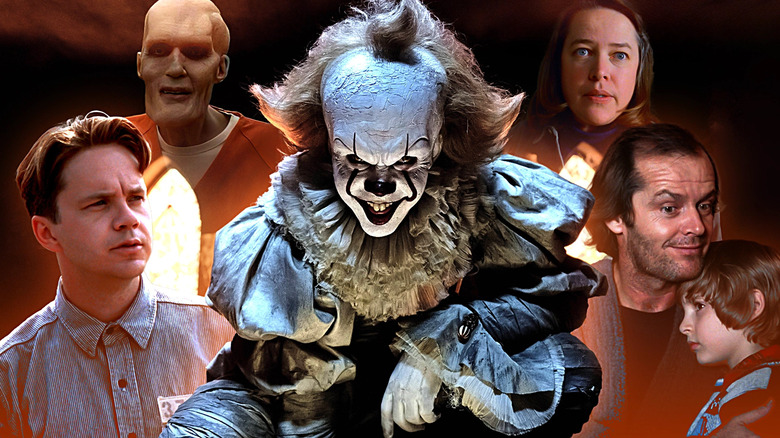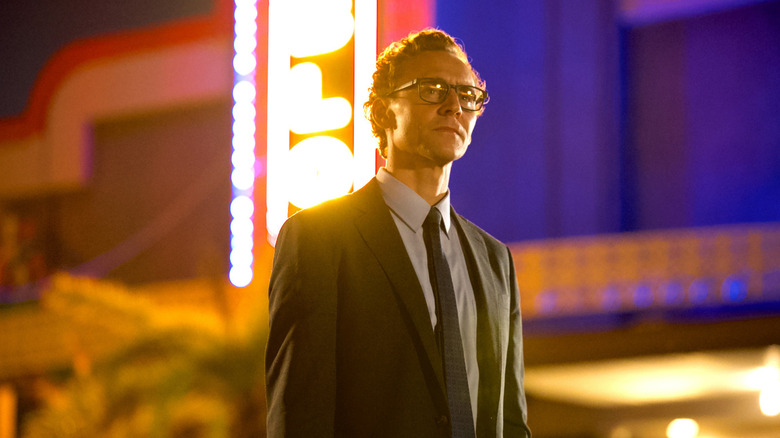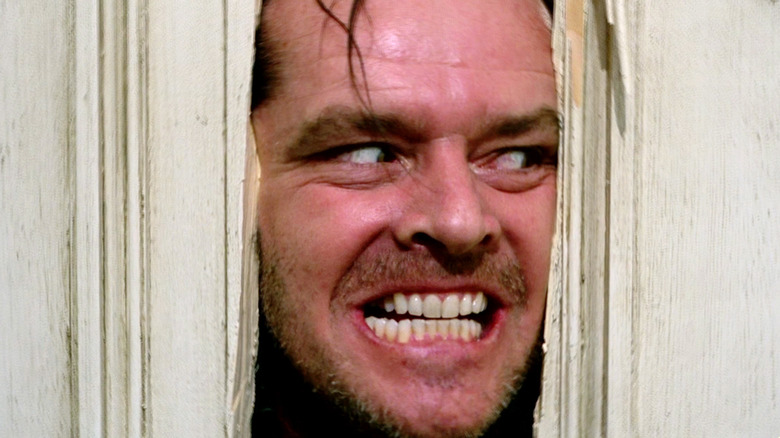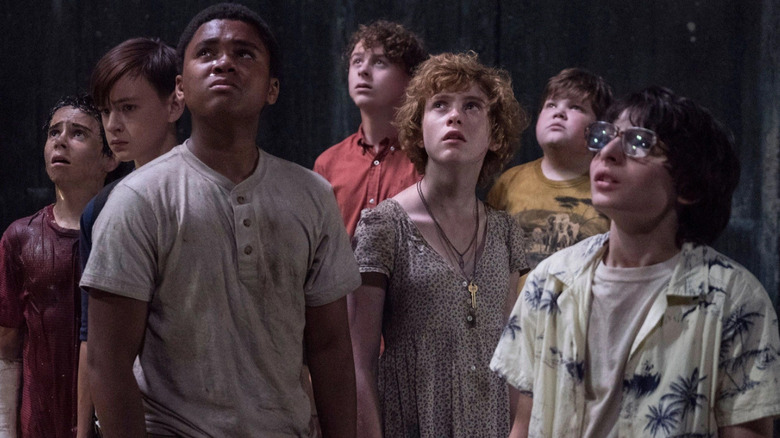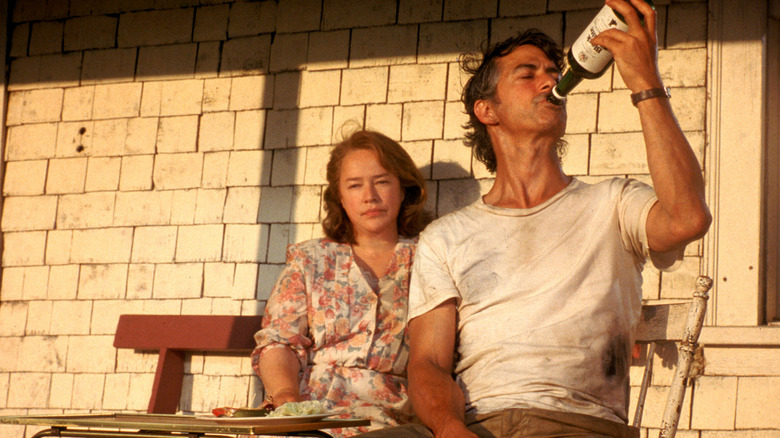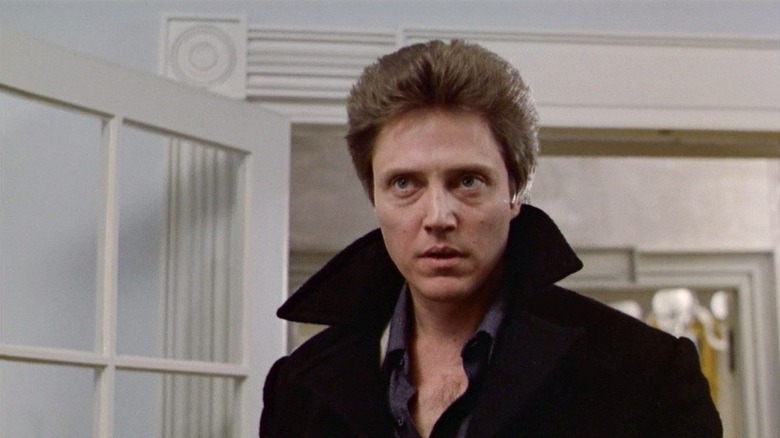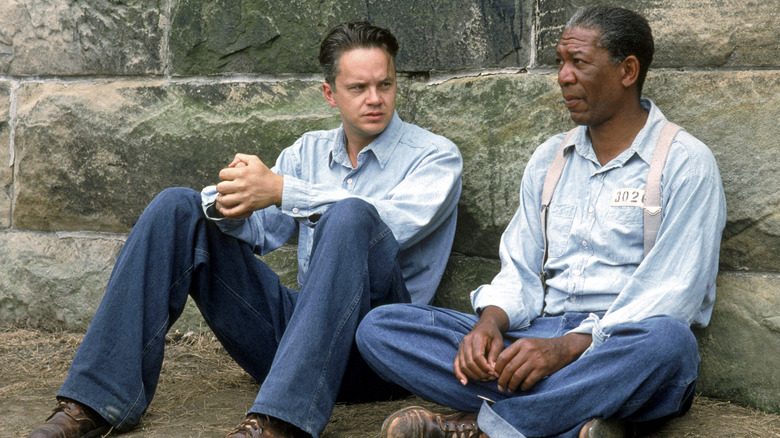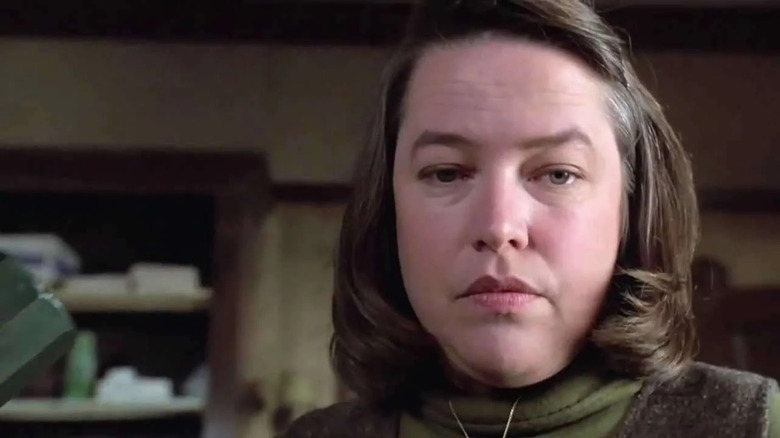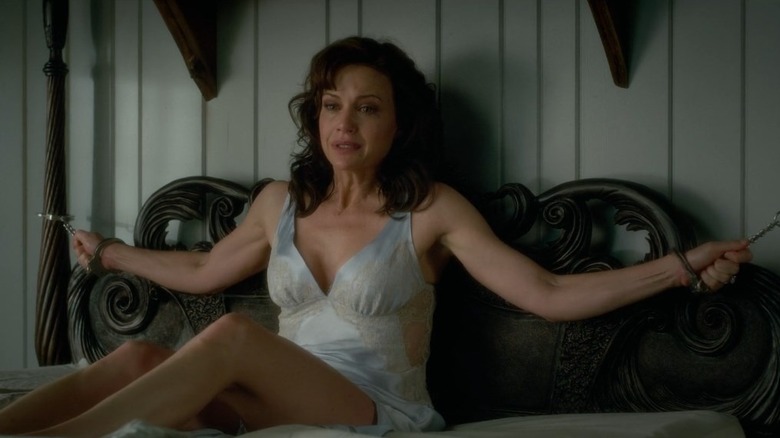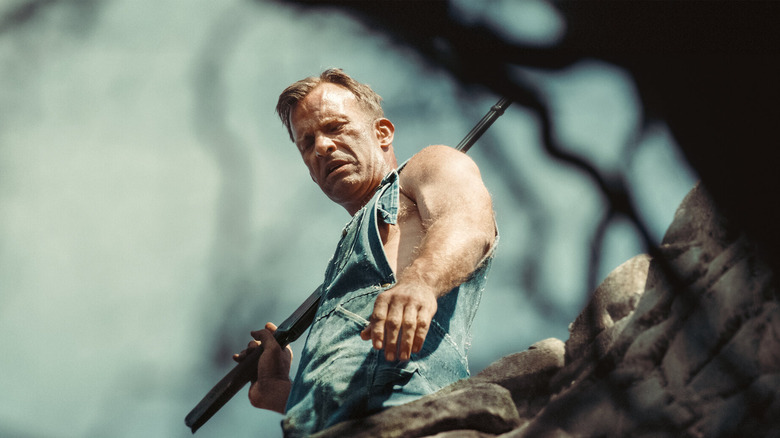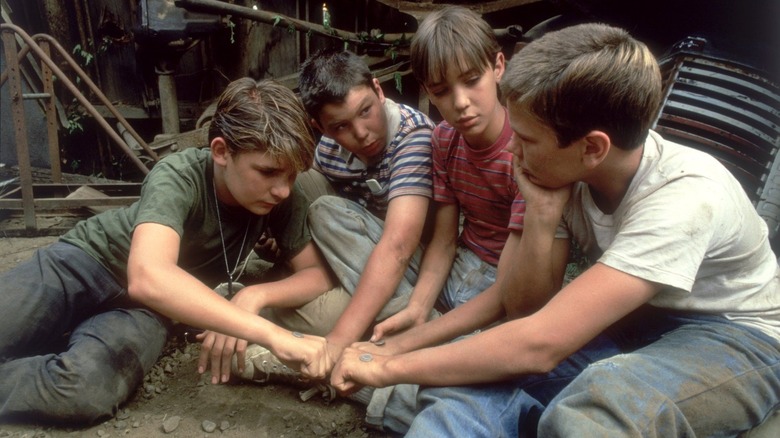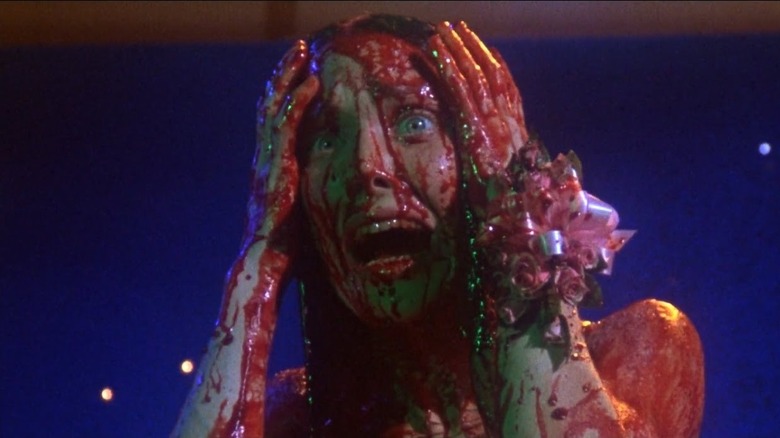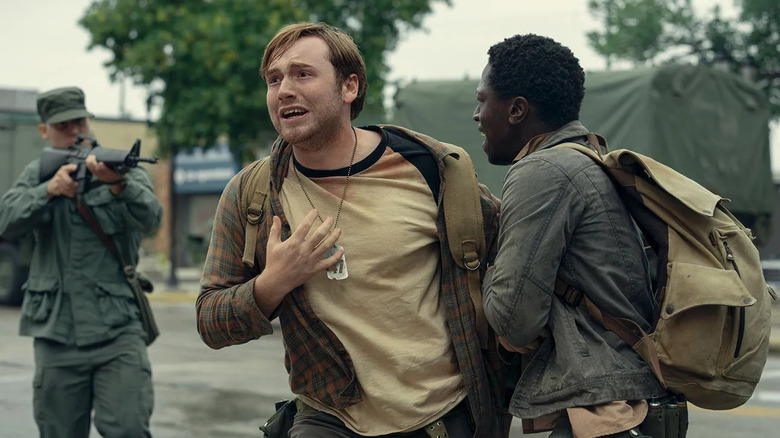The 12 Best Stephen King Movies Ranked, According To Rotten Tomatoes
Stephen King adaptations are practically their own cinematic subgenre at this point, and the last few years have been proof that audiences can't get enough of him thanks to "The Boogeyman," "The Life of Chuck," "Salem's Lot," "The Monkey," and "The Institute." At the time of publication, "The Long Walk" and "The Running Man" are two of the most anticipated releases of the year, proof that King still reigns supreme. So yeah, the volume is undeniable. But what about the quality?
As a longtime King fan, I'll admit: I genuinely enjoy most of the films based on his work. Still, let's be real — not every entry is a winner (yes, I'm specifically talking to YOU, "Dreamcatcher"). However, some adaptations are so undeniable and so well-loved that they can overcome the stigma often lobbied by critics against horror movies, which makes for an interesting discussion. Rotten Tomatoes should never be treated as the gospel of whether or not a film is "good," but it is a fascinating aggregate to see which films seem to resonate the most with audiences. You may be surprised to learn that even King's most iconic adaptations weren't universally adored upon their release, and some all-time favorites didn't even crack the list.
That said, here are the top 12 Stephen King movies ranked by their RT score.
12. The Life of Chuck (81%)
One of the most recent adaptations of a King novel is also one of his most interesting, the feature adaptation of his 2020 novella "The Life of Chuck," from his "If It Bleeds" collection. Adapted by King aficionado Mike Flanagan, the story chronicles the life of Charles "Chuck" Krantz from childhood to adulthood, told in an atypical story structure that is better left unspoiled. It's an earnest film with an overflowing well of empathy at the center, which becomes the film's superpower.
As /Film's Bill Bria wrote in his review of the film, "Though he can certainly be accused of wearing his heart on his sleeve (and letting himself and his actors indulge in monologuing), Flanagan innately understands what kind of audience he's making a movie for, and he never lets 'Chuck' tip into total cynicism or saccharinity." Alas, that saccharine sweetness proved to be a bit too much for some critics who couldn't get on board with the schmaltz, which is why the film is just barely making the cut.
11. The Shining (84%)
Stanley Kubrick's adaptation of "The Shining" is one of the most popular and controversial adaptations of any story by the King of Horror. As an adaptation? It's honestly pretty terrible. As a horror movie? It's a stone-cold classic. King famously hated "The Shining" and had no problems expressing why, but movie lovers the world over and across generations have clearly felt differently. Kubrick's take has become synonymous with American pop culture, enduring as a masterwork because it's truly one of a kind. There's an unsettling ambiguity attached to every character, with the audience never fully knowing if the Torrance family is seeing ghosts, going crazy, or both.
Kubrick's perfectionist tendencies are well on display, with every frame presented with an almost clinical precision as the chaos of Wendy Carlos' score continually throws the viewer off balance. Jack Nicholson and Shelley Duvall provide two of horror's greatest performances, but "The Shining" ranks surprisingly low here compared to other adaptations. Naysayers find the film to be a bit heavy-handed and over-the-top, but real ones recognize it as the masterful horror film that it is, and has always been.
10. It: Chapter One (85%)
Stephen King's "It" is arguably his most well-known horror novel, due in large part to the legacy of Pennywise instilling a wicked case of coulrophobia into multiple generations. While the 1990 two-part miniseries on ABC was a sensation for the time, it was director Andy Muschietti and screenwriters Chase Palmer, Cary Fukunaga, and Gary Dauberman's "It: Chapter One" that became the highest-grossing horror film of all time. By focusing on the childhood anxieties of The Losers Club — Bill Denbrough, Beverly Marsh, Ben Hanscom, Richie Tozier, Eddie Kaspbrak, Stanley Uris, and Mike Hanlon — and the way the It entity weaponizes those fears against them, "It: Chapter One" is the perfect combination of King's greatest strengths: nightmare-inducing imagery and wildly impressive child performances.
An 85% is certainly nothing to sneeze at. Still, it's doubly impressive when you consider that due to the large-scale release, it's an average score compiled from 390 Rotten Tomatoes-certified critics, compared to the 81 critics who reviewed "Gerald's Game," which was released the same year. We know that RT scores are not the end-all, be-all in terms of defining a film's legacy, and there's arguably no better example of that than "It: Chapter One." Bill Skarsgård's Pennywise makeup has become the most prominently cosplayed and merchandised, and every time the film winds up on Netflix, it skyrockets to the top of the charts. People just can't get enough of that dancing clown.
9. Dolores Claiborne (86%)
Easily one of the most underrated and underseen major adaptations of King's work, "Dolores Claiborne" is well-loved by King himself. The second King adaptation to star Kathy Bates and directed by Taylor Hackford, "Dolores Claiborne" is about the titular New England woman after she is accused of murdering her elderly employer. What complicates her accusation is that we learn this isn't the first time Dolores was suspected of murder. Back in the 1970s, Dolores' abusive husband (David Strathairn) died under mysterious circumstances, and she was believed in the court of public opinion to have been his killer.
While the film tackles some seriously horrific subject matter, it's more of a character-driven mystery with a fantastic script from "Andor" creator Tony Gilroy and a haunting theme from Danny Elfman. While the film understandably lives and dies on Bates' performance, she's boosted by a terrific supporting cast, including Jennifer Jason Leigh as Dolores' troubled daughter, Judy Parfitt, and Christopher Plummer's Detective John Mackey, a local cop determined to put Dolores behind bars. The film also marks an early-career performance from John C. Reilly, an evergreen reminder that he's so much more than just a comedy actor.
8. The Dead Zone (89%)
Does 1983's "The Dead Zone" totally rule? Yes. Was I still absolutely shocked to see this bad boy crack the top 12 over movies like "The Green Mile?" Also yes. David Cronenberg's filmography has become synonymous with body horror, but he hopped into the director's chair to adapt one of Stephen King's banned books and craft one of his most insightful works. The film centers on a schoolteacher named Johnny Smith (Christopher Walken) who awakens from a coma following a car accident to find that years have passed and he's now developed a psychic ability that allows him to see a person's future just by touching them, which means he's plagued with the knowledge of humanity's worst impulses ... including politicians.
"The Dead Zone" is one of King's most damning indictments of the American political system, allowing the film to feel incredibly relatable despite the supernatural elements or twisty mystery at the center. It boasts some truly unsettling moments, but remains a refined and accessible horror story compared to much of Cronenberg's other works. Thanks to his measured direction and a stark, almost clinical visual flair to present King's story, this venture into the city of Castle Rock remains one of the finest.
7. The Shawshank Redemption (89%)
A film's success cannot and should not ever be solely defined by its box office performance, because one Stephen King adaptation initially flopped in theaters, but has since been recognized as one of the greatest films ever made. As of publication, Frank Darabont's adaptation of "The Shawshank Redemption" currently remains at the top of IMDB's top 250, above other notable classics like "The Godfather," "Schindler's List," "The Lord of the Rings: The Fellowship of the Ring," and Christopher Nolan's $1 billion Batman epic "The Dark Knight."
The thoughtful prison drama based on King's novella "Rita Hayworth and the Shawshank Redemption" failed to bring in audiences during its theatrical run, but after it was nominated for seven Academy Awards and positive word of mouth once the film was available on home video, it became the top video rental of 1995. Its true legacy of success, however, lies in syndication. After Turner Broadcasting System acquired Castle Rock Entertainment, "The Shawshank Redemption" was introduced to an even larger audience (it's certainly how I saw it for the first time as a child in 1997). Imagine being one of the few critics who had something negative to say about it back in 1994. Embarrassing!
6. Misery (91%)
"Misery" is undoubtedly one of the most successful and beloved adaptations of King's work, because it is home to two all-time great horror performances: James Caan as famed novelist Paul Sheldon, and Kathy Bates' Oscar-winning portrayal of his superfan captor, Annie Wilkes. Stripping away the supernatural elements that helped put King on the map, "Misery" is an intimate and human story that reveals the monstrous capabilities of human beings, elevated by the stunning direction of "Stand By Me" helmer, Rob Reiner.
Everything about the film is a towering achievement, but the film's legacy is anchored by the unpredictable threat of Bates' Wilkes, and Caan's quiet, mounting desperation as Paul Sheldon. Now that we live in a world where "stan culture" has been normalized, a film like "Misery" exists as a warning flag. Honestly, I'm shocked that "Misery" doesn't have a higher rating, as I've personally never met someone in the nearly two decades I've been working in entertainment journalism who doesn't love this film. But then again, RT also accepts critics from conservative outlets that find the film to be a little too violent.
5. Gerald's Game (91%)
It was thought to be one of Stephen King's "unfilmable" stories, but writer/director Mike Flanagan is no ordinary filmmaker. In his first of what would become many King adaptations, Flanagan tackled "Gerald's Game," a story where the protagonist is handcuffed to a bed for 90% of the duration, meaning the majority of the story takes place in her thoughts. Husband and wife Jessie and Gerald (Carla Gugino and Bruce Greenwood) vacation to a remote cabin to spice up their love life, but after Gerald handcuffs Jessie to a bed for some adventurous play, he has a heart attack and dies.
Now, Jessie is stuck handcuffed to the bed, where no one can hear her scream, as her husband's dead body is just there. The end result was a riveting horror film with one particularly horrifying sequence, and a career-revitalizing performance by Gugino. For such an interior novel, Flanagan transforms Jessie's thoughts into something beautifully cinematic, with Jessie's emotionally resonant journey through her own memories that led her to this place portrayed with deep empathy and resilience. Alas, like most King stories themselves, the last 10 or so minutes of the film feel a bit clunky, which only confirms that "Gerald's Game" is one of the very best adaptations of King's work.
4. 1922 (92%)
Originally published as a part of his collection "Full Dark, No Stars" before getting a stand-alone release in 2017, "1922" was a shocking hit for Netflix and Australian writer/director Zak Hilditch. A horrific crime thriller, "1922" tells the story of a farmer named Wilf (Thomas Jane), who makes a plan to kill his wife to prevent her from selling their farm, and convinces his teenage son Henry (Dylan Schmid) to help him with the murder and cover-up. It's a harsh and uncompromising story centered on an absolutely insidious father and his now-broken son, but Hilditch wisely elected not to shy away from the monstrosity of man. There's a constant sense of dread growing with each passing minute, making "1922" an emotionally relentless film packed with great performances and a story that feels like King doing his own take on Edgar Allan Poe's "The Tell-Tale Heart," but with a hell of a lot more rats.
Those who enjoy the film were clearly impacted by the slow, methodical disintegration of the human psyche at the hands of guilt and the consequences of foregoing your morality, while those who dislike it were mostly just bored. What makes this ranking so interesting is that when comparing the Rotten Tomatoes score to that of IMDb (6.2/10) or Letterboxd (2.8/5), "1922" is a far cry from the 92% on RT. It's a perfect example that there's no such thing as a "general consensus," even when it comes to aggregating opinions in one place.
3. Stand By Me (92%)
When it comes to coming-of-age stories for white boys, "Stand By Me" is truly the gold standard. First published in King's 1982 collection "Different Seasons" as the novella "The Body," screenwriters Raynold Gideon and Bruce A. Evans beautifully adapted King's tale into one of the best films of the 1980s, and the most touching addition to director Rob Reiner's filmography. Set in King's recurring Castle Rock in the summer of 1959, "Stand By Me" follows the journey of four friends — Gordie Lachance, Chris Chambers, Teddy Duchamp, and Vern Tessio — as they venture into the woods in search of a rumored corpse.
What starts out as an adventure rooted in morbid curiosity slowly unfolds into a deeply relatable exploration of friendship, grief, and the growing pains that come with leaving childhood behind. Narrated by a grown-up Gordie (Richard Dreyfuss) and injected with the hindsight of adulthood, "Stand By Me" is a reminder that even a single summer during your tween years can have a lifelong impact and shape the way you view the world and existing within it for the rest of your life. It's a story less about finding a dead body and more about a group of boys discovering who they are, and who they're about to become.
2. Carrie (94%)
When one of the greatest filmmakers to ever do it decides to adapt the horror novel responsible for launching Stephen King's career into the stratosphere, there's no surprise that the result is nothing short of a masterpiece. "Carrie" has been adapted into two feature films, given a legacy sequel with "The Rage: Carrie 2," adapted into a made-for-TV movie, and made into a Broadway stage musical. It will soon receive the miniseries treatment courtesy of frequent King-adapter, Mike Flanagan. While we've still yet to see a Carrie White on screen that properly resembles the character King envisioned when writing his novel, her story of being ostracized, othered, and relentlessly bullied is evergreen.
Brian De Palma's 1976 film with screenwriter Lawrence D. Cohen, starring the ethereal Sissy Spacek, quickly became a defining work as a raw, horrific character study of feminine vengeance — conveying the story of a bullied girl with telekinetic powers with both empathy and explosivity. The prom sequence has become truly iconic, a fiery bloodbath meant to terrify not just bullies, but all of those who second-guess the power of womanhood.
Carrie provides an outlet for catharsis when she unleashes her righteous fury on those who have wronged her, a fantasy that sometimes the bad people really do get what's coming to them. De Palma understood that the monster isn't Carrie White, but the world that made her burn. No wonder the film has resonated with so many after all these years.
1. The Long Walk (95%)
It's taken nearly 50 years, but a Stephen King adaptation has finally dethroned Brian De Palma's "Carrie," and it's one of the books King started writing before "Carrie," but wasn't able to publish until after he found success as an author. "The Long Walk" was the novel King started writing as a teenager, but he originally published it under his Richard Bachman pseudonym. "The Long Walk" has been described as one of his bleakest works (because it is), and countless filmmakers have been trying to adapt the work for the better part of four decades, an unfortunately evergreen dystopian story about young men chosen by lottery to walk until only one boy is left standing.
As I noted in my /Film review, "Stephen King is rightfully celebrated for his mastery of horror, but far less often is he praised for his piercing, often uncomfortable insight into the emotional interior lives of young men [...] 'The Long Walk' has always been my favorite example of valorizing the friendships nurtured between and by boys, allowing them to carry the same weight as any romantic love story. It argues, with aching clarity, that these connections can shape a person for the rest of their life." We should all be thankful that the film was not adapted until now, because Francis Lawrence and JT Mollner's 2025 film is undoubtedly the best possible adaptation of the text.
"The Long Walk" is now the highest-rated Stephen King adaptation, and for good reason.
